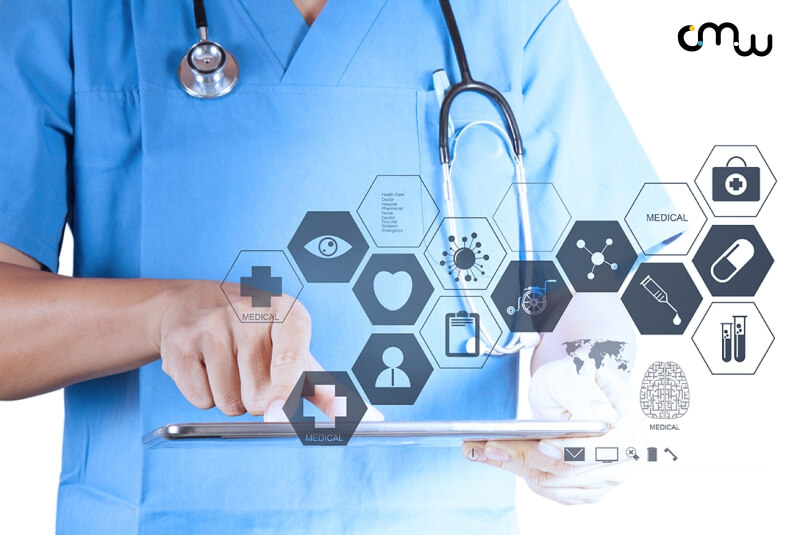Artificial Intelligence (AI) is rapidly transforming various industries, including healthcare. In healthcare marketing, AI presents a wealth of opportunities for organizations to improve their marketing strategies and reach their target audience more effectively. By leveraging AI, healthcare organizations can personalize their marketing efforts, identify potential customers, and deliver the right message to the right audience at the right time. In this article, we will explore the potential benefits of AI in healthcare marketing and provide insights into how healthcare organizations can leverage AI to improve their marketing strategies.
Understanding AI in Healthcare Marketing
AI, or artificial intelligence, is the simulation of human intelligence processes by machines, especially computer systems. In the healthcare marketing industry, AI has emerged as a powerful tool for analyzing data, predicting future trends, and making informed decisions. One of the primary applications of AI in healthcare marketing is through the use of personalized marketing. By analyzing large amounts of data on consumer behavior, AI can provide insights into individual preferences and develop targeted marketing campaigns to increase engagement and loyalty. Additionally, AI can be used for predictive analytics, enabling healthcare organizations to anticipate future trends and respond proactively to consumer needs. Overall, the potential advantages of AI in healthcare marketing include increased efficiency, accuracy, and effectiveness.
Personalized Marketing with AI
Personalized marketing with AI is the use of machine learning algorithms to analyze patient data and create targeted marketing campaigns tailored to individual patients. With the help of AI, healthcare organizations can gather and analyze data from various sources, such as electronic health records, patient feedback, and online behavior, to gain a better understanding of their patient's preferences and needs. This data can then be used to create highly personalized marketing campaigns that are more likely to resonate with patients and improve their overall experience.
One example of personalized marketing with AI is targeted advertising, where ads are displayed to specific groups of patients based on their demographics, interests, and behaviors. For instance, a healthcare organization may use AI algorithms to identify patients who have recently searched for information on a particular medical condition and then display relevant ads to them on social media or other online platforms.
Another example of personalized marketing with AI is tailored email campaigns, where healthcare organizations send targeted emails to patients based on their health history, preferences, and behavior. These emails may contain information on relevant health topics, appointment reminders, and personalized offers that are more likely to engage patients and encourage them to take action.
The benefits of personalized marketing with AI in healthcare are numerous. By creating targeted marketing campaigns, healthcare organizations can improve patient engagement, increase patient satisfaction, and ultimately drive revenue. Personalized marketing can also help healthcare organizations build stronger relationships with their patients and foster loyalty over time.
Predictive Analytics with AI
Predictive analytics is an application of AI that involves the use of data, statistical algorithms, and machine learning techniques to identify the likelihood of future outcomes based on historical data. In healthcare marketing, predictive analytics can be used to analyze patient data, such as demographics, medical history, and social media behavior, to anticipate healthcare needs and preferences. This can allow healthcare organizations to tailor their marketing strategies to specific patient groups, improving patient engagement and satisfaction. Additionally, predictive analytics can help healthcare organizations identify trends and patterns in patient behavior, allowing for more efficient use of resources and improved patient outcomes. For example, healthcare organizations can use predictive analytics to identify patients who are at high risk for readmission and develop targeted interventions to prevent readmission.
AI-powered Chatbots
AI-powered chatbots have become increasingly popular in healthcare marketing as they provide patients with a quick and easy way to access information. These chatbots are designed to simulate human conversation and can provide patients with answers to their questions in real time. AI-powered chatbots can also use natural language processing (NLP) to understand the intent behind a patient's inquiry and provide personalized responses.
One of the main benefits of AI-powered chatbots is improved patient satisfaction. Patients can access the information they need 24/7, without having to wait for office hours or speak to a healthcare professional. Additionally, AI-powered chatbots can provide patients with accurate information, which can help to alleviate anxiety and stress related to healthcare concerns.
Another benefit of AI-powered chatbots is that they can decrease the workload of healthcare staff. Simple inquiries and requests can be handled by the chatbot, allowing healthcare professionals to focus on more complex issues. AI-powered chatbots can also provide healthcare organizations with valuable insights into patient needs and preferences, which can inform marketing and patient engagement strategies.

Automated Data Collection and Analysis
Automated data collection and analysis refers to the use of AI to gather and analyze large volumes of data quickly and accurately. In healthcare marketing, this technology can be used to analyze patient behavior and preferences to create more targeted and effective marketing strategies. AI-powered algorithms can gather data from multiple sources, such as social media and website analytics, and use that information to create a detailed picture of patient behavior. This can help healthcare organizations to understand what patients are looking for and what types of marketing messages are most effective. Additionally, automated data collection and analysis can help healthcare organizations to allocate resources more efficiently by identifying the most effective marketing channels and focusing efforts there. Overall, the use of AI in automated data collection and analysis has the potential to improve the effectiveness and efficiency of healthcare marketing strategies.
Challenges in Implementing AI in Healthcare Marketing
Implementing AI in healthcare marketing can be challenging due to various factors. One of the significant challenges is privacy concerns. The use of AI in healthcare marketing requires collecting patient data to create personalized marketing campaigns. Patients may not be comfortable with their data being used for marketing purposes, leading to privacy concerns. Healthcare organizations need to implement robust data protection protocols to protect patient data and ensure its confidentiality.
Another challenge is ethical considerations. AI algorithms are only as unbiased as the data that trains them, which can lead to algorithmic biases. Therefore, healthcare organizations need to ensure that their AI-powered marketing strategies are not discriminatory and do not reinforce existing biases. Additionally, healthcare organizations need to ensure that the use of AI in marketing does not compromise the quality of care provided to patients. AI-powered marketing strategies must be used responsibly and ethically to improve patient outcomes.
To fully leverage the benefits of AI in healthcare marketing, healthcare organizations must address these challenges and ensure that they implement responsible and ethical AI-powered marketing strategies.
Examples of Successful AI Implementation in Healthcare Marketing
Mayo Clinic, a renowned medical center in the United States, has implemented AI in its marketing by using a virtual assistant named "Mayo" on its website. Mayo provides personalized health information and helps patients find the right healthcare services. The virtual assistant is powered by IBM Watson, an AI technology that helps to analyze large amounts of data and provide relevant information to patients. Mayo Clinic also uses AI to analyze patient data and identify patterns that can help inform its marketing strategies.
Boston Children's Hospital has implemented AI in its marketing by developing a chatbot named "KidsMD," which helps parents diagnose and treat their children's illnesses. The chatbot is powered by machine learning technology and uses natural language processing to understand parents' queries. The chatbot provides accurate and timely information, reducing the need for parents to search for information on their own. Boston Children's Hospital also uses AI to analyze patient data and identify trends in patient behavior, which helps to inform its marketing strategies.
Both of these examples demonstrate the successful implementation of AI in healthcare marketing, providing personalized information to patients and improving their overall experience. The use of AI also helps healthcare organizations to collect and analyze patient data, allowing them to understand patient needs and preferences better and tailor their marketing strategies accordingly.
Future Trends in AI and Healthcare Marketing
In recent years, the use of AI in healthcare marketing has become increasingly common and is expected to continue to grow in the future. One trend that is expected to become more prevalent is the use of virtual assistants, which can provide patients with personalized information and assistance. Additionally, as AI technology continues to advance, healthcare organizations can use predictive analytics to anticipate patient needs and preferences even more accurately.
While these trends offer exciting possibilities for improving healthcare marketing, there are also potential challenges to consider. For example, as virtual assistants become more common, there may be concerns about patient privacy and data security. Additionally, the use of advanced predictive analytics may require healthcare organizations to invest in more sophisticated technology and data management systems.
Despite these challenges, the potential benefits of AI in healthcare marketing are significant. By leveraging AI technology, healthcare organizations can improve patient engagement, increase efficiency, and ultimately provide better care to their patients. As AI continues to advance, we will see even more innovative and practical uses of this technology in healthcare marketing.
In conclusion, AI offers significant potential for healthcare organizations to improve their marketing strategies and ultimately enhance patient outcomes. While there are challenges to implementing AI in healthcare marketing, organizations that can successfully leverage this technology stand to gain a competitive advantage. As healthcare organizations continue to explore the benefits of AI, it will be essential to balance the potential advantages with ethical considerations and patient privacy concerns.
At Compendious Med Works, we are a healthcare marketing agency that understands the potential of AI in improving patient outcomes. Our team of experts is dedicated to utilizing the latest technologies, including AI, to develop marketing strategies that are tailored to the unique needs of each healthcare organization. AI has the power to transform healthcare marketing and is committed to staying at the forefront of this rapidly evolving field.
















